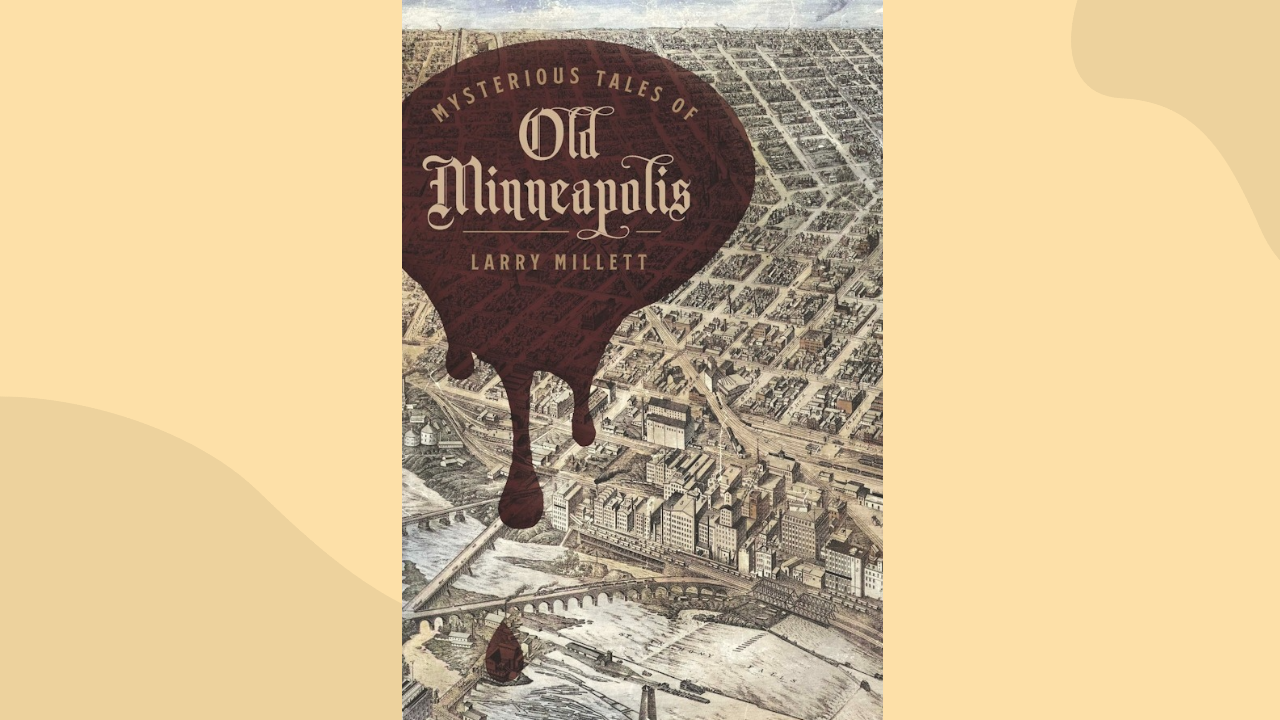In his new collection of novellas, Mysterious Tales of Old Minneapolis (University of Minnesota Press, 296 pages), local author Larry Millett presents a trio of intriguing tales of murder, all set in—where else?—old Minneapolis.
The first of these stories, "Murder at the Falls," takes readers to the Perfection Flour Mill at St. Anthony Falls, where an owner has died "under grotesque circumstances" and suspicion falls on the other owner, "plunging the city into a frenzy of dark speculation."
You can read an excerpt from that tale below, and stop by Once Upon a Crime (604 W. 26th St., Minneapolis) on Thursday, November 13 at 6 p.m. for a reading and launch event.
DEATH AT THE PERFECTION
In a city where flour was as gold, the Perfection Mill had no equal. Built of massive limestone walls rising to a height of six stories, the Perfection was the pride of Minneapolis, towering over the Falls of St. Anthony like a medieval fortress. Within its confines 13 of the finest French buhrstones ground wheat into 100,000 pounds of flour every day amid a bewildering maze of gears, belts, pulleys, and shafts tended by men in white dustcoats who moved cautiously about their business lest an arm or leg or life itself be sacrificed to the roaring machinery.
“It is a wonderland of human ingenuity,” wrote an awed correspondent from Harper’s Weekly who toured the mill shortly after it opened in 1867. “There can be no doubt that the Perfection lives up to its name or that Minneapolis, which sprang up like an exhalation from the prairies a mere decade ago and which is already an extraordinary beehive of industry, is sure to become the greatest metropolis of the Northwest.”
Two transplanted Easterners of very different character, Stoddard Chase and Ransom Everleigh, had built the mill and remained its owners, although they had long been at odds and usually communicated only through subalterns.
The son of a Massachusetts industrialist, Chase was broad of body and fierce of demeanor, with heavily hooded eyes and a long black beard that gave his face a dark and brooding cast. He was also a mechanical wizard who’d overseen construction of the Perfection down to its last detail. A terrifying glare was his chief instrument of domination, and he brooked no dissent from his subordinates. When he spoke—in a deep, menacing voice—it was wise to listen, for he was one of those men who sit hard upon the world and believe they can subdue it with an iron will.
Everleigh stood in utter contrast to Chase. As thin and quick as an elf, he hailed from New York, where his father had been a silver-tongued Wall Street broker until an indictment for fraud caused him to flee to the tropics, never to be heard from again. Navigating the treacherous world of high finance and luring in investors were Everleigh’s chief talents. Unlike his humorless partner, Everleigh loved to jape and josh, and no social event among the better classes in Minneapolis was complete without his scintillating presence. Exceptionally handsome, with a head of hair that seemed to grow only lusher with age, Everleigh was also known for his many entanglements with women, none of whom had managed to snare him as a husband.
The Perfection was one of more than a dozen mills—“pigs at a trough,” one wag dubbed them—that drew water from a canal paralleling the Mississippi River just below the falls. The Perfection’s pumping hearts were two bladed, 350-horsepower Boyden turbines made in Massachusetts. Mounted horizontally at the bottom of a pair of 40-foot deep, iron-lined pits carved out of the same limestone from which the mill had been built, the turbines turned falling water into power, producing so much torque that it seemed at times as though they might twist the mill off its very foundations and send it into a wild, whirling dance. Perpendicular shafts connected to the turbines distributed power through the mill, and once the plunging water had done its work tailraces returned it to the river.
On the morning of June 6, 1872, workers at the Perfection began their shift, as they always did, by opening metal gates in the mill’s basement. As a horn sounded to alert the men that the mill was about to spring to life, water from the canal rushed through the open gates into short headraces before thundering down into the pits where the four-foot-diameter turbines awaited their daily duties. Within seconds the turbines began to spin, setting the mill’s machinery in motion. One of the turbines, known as the A, controlled the mill’s grinding stones, while the other, the B, powered auxiliary machinery.
The Perfection’s foreman, Peter Nichols, knew the throaty hum of the turbines as well as anyone, and his ears told him almost at once that something was wrong. An ominous shudder pulsed through the mill, and instead of starting to grind at speed the paired millstones arrayed in ranks on the Perfection’s upper floors struggled to gain momentum, as though slowed by an invisible brake. Seconds later, the millstones stopped altogether.
Excerpted from Mysterious Tales of Old Minneapolis by Larry Millett. Published by the University of Minnesota Press. Copyright 2025 by Larry Millett. Used by permission.






